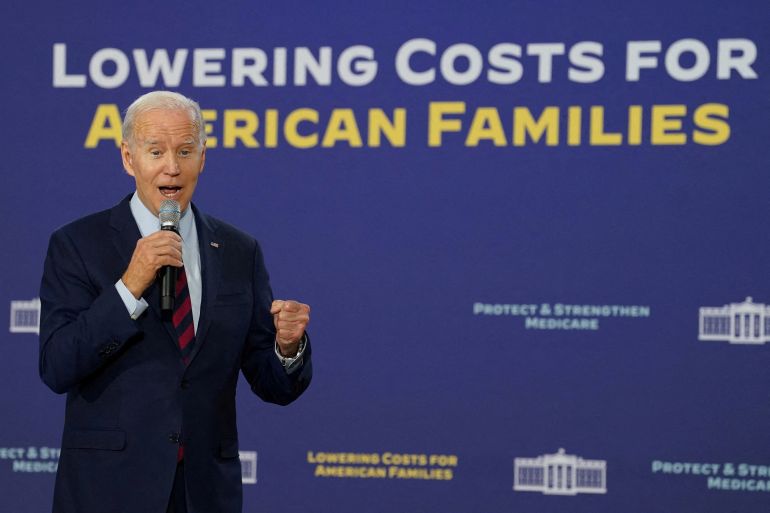US names 10 prescription drugs subject to price negotiations
Move is expected to cut costs for some patients but faces lawsuits from drugmakers and heavy criticism from Republicans.

US President Joe Biden’s administration has released a list of 10 prescription medicines that will be subject to the first-ever price negotiations by the United States Medicare health programme, a move that could affect tens of millions of people.
Biden’s signature Inflation Reduction Act (IRA), signed into law in August last year, allows the health programme for Americans aged 65 and over to negotiate prices for some of its most costly drugs.
Keep reading
list of 3 itemsBiden administration extends protected status for Ukrainians in US
Biden says ‘no place’ for white supremacy in US after Florida racist attack
Medicines on the list released by the White House on Tuesday morning include Merck & Co’s diabetes drug Januvia, Eliquis rival Xarelto from Johnson & Johnson and AbbVie’s leukaemia treatment Imbruvica.
Amgen’s rheumatoid arthritis drug Enbrel, Boehringer Ingelheim and Eli Lilly’s diabetes drug Jardiance, J&J’s arthritis and Crohn’s disease Stelara, and insulin from Novo Nordisk are also on the list.
“For far too long, Americans have paid more for prescriptions drugs than any major economy,” the White House said in a statement. “Today, Medicare has for the first time selected 10 drugs for negotiation. Seniors paid $3.4 billion in out-of-pocket costs for these drugs in 2022.”
The move is expected to cut costs for some patients but faces litigation from the drugmakers and heavy criticism from Republican lawmakers.
It also represents a centrepiece of Biden’s re-election pitch as he seeks a second term in office by touting his work to lower costs for Americans at a time when the country has struggled with high inflation.
More than 52 million people who either are 65 or older or have certain severe disabilities or illnesses get prescription drug coverage through Medicare’s Part D programme, according to the Centers for Medicare and Medicaid Services.
About 9 percent of Medicare beneficiaries age 65 and older said in 2021 that they did not fill a prescription or skipped a drug dose due to cost, according to research by the Commonwealth Fund, which studies healthcare issues.
Americans also pay more for prescription drugs than patients in all other developed nations.
Under the programme, the minimum cut from a drug’s list price will be 25 percent, but the government could barter for much bigger discounts.
Tuesday’s announcement kicks off the negotiation process for the 10 drugs whose new prices would go into effect in 2026. The programme aims to save $25bn per year on drug prices by 2031.
The White House said on Tuesday that the Medicare agency aims to negotiatiate prices for as many as 60 drugs over the next four years, followed by an additional 20 drugs every year after that.
The 10 initial drugs will have met certain criteria set out by Medicare. They must be sold in pharmacies, not have substantial generic competition and have been on the market for at least nine years.
Once the list is out, drugmakers will have until October 1 to sign agreements to participate in the talks and until October 2 to submit data on their medicines, including research and development and production costs, information on patent applications and revenue and sales volume.
The pharmaceutical industry has been gearing up for months to fight these rules.
Already, the plan faces several lawsuits, including complaints filed by drugmakers Merck and Bristol Myers Squibb and a key lobbying group, the Pharmaceutical Research and Manufacturers of America.